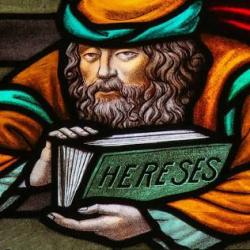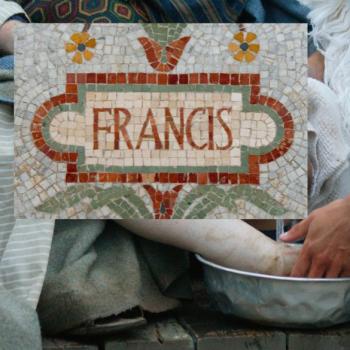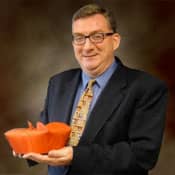It's a poem that every Catholic schoolchild knew once upon a time. Eugene O'Neill could recite Francis Thompson's "Hound of Heaven" from memory, and J.R.R. Tolkien was an admirer of it. G.K. Chesterton considered Thompson one of the great English poets, a "shy volcano." Although Victorian poetry may be out of fashion today, many still find comfort in Thompson's image of a loving God relentlessly pursuing the wayward soul:
I fled Him, down the nights and down the days;
I fled Him, down the arches of the years;
I fled Him, down the labyrinthine ways
Of my own mind; and in the mist of tears
I hid from Him, and under running laughter.
Up vistaed hopes I sped;
And shot, precipitated,
Adown Titanic glooms of chasmèd fears,
From those strong Feet that followed, followed after.
But with unhurrying chase,
And unperturbèd pace,
Deliberate speed, majestic instancy,
They beat-and a Voice beat
More instant than the Feet-
'All things betray thee, who betrayest Me.'
What many didn't know was that this poem, hailed as one of the great Catholic poems, was the product of a deeply troubled soul, a man who battled addiction, poverty and depression throughout his adult life.
He started off in life rather comfortably, a doctor's son in northern England. The oldest of three, he grew up a shy introverted child with a strong love for the classics, especially Shakespeare. Some biographers have suggested there was something about young Thompson that made it doubtful whether he would ever "make it" in the "real world."
As a young boy, he attended Ushaw College, a recently founded Catholic school in northern England. It was thought that he might pursue the priesthood, but his frail health precluded it. His father wanted him to enter medical school, which he did. But deep in his heart, Francis knew that this wasn't his calling either. As an early biographer writes, he "made a pretense of study" for six years. However, he never practiced medicine.
Instead, an inner voice was drawing him toward a literary life, and to London. He started off as a bookseller, at which he was less than successful. For a while he worked in a shoemaker's store before he ended up homeless on the streets of London. For three years, he sold matches, called cabs, begged for his subsistence, and fought a growing drug habit. He found some solace in the public libraries, but he was banned for his ragged appearance. A peer wrote:
A stranger figure than Thompson's was not to be seen in London. Gentle in looks, half-wild in externals, his face worn by pain and the fierce reactions of laudanum, his hair and straggling beard neglected, he had yet a distinction and aloofness of bearing that marked him in the crowd; and when he opened his lips he spoke as a gentleman and a scholar. It was impossible and unnecessary to think always of the tragic side of his life.
At one point, he attempted suicide. But a London prostitute took him in, gave him a place to stay, and looked after him for a while. Thompson never revealed her name, but he would later refer to her as his savior.
In 1887, he sent some poems to Wilfrid Meynell, editor of a Catholic literary magazine titled Merry England. Thompson apologized "for the soiled state of the manuscript. It is due, not to slovenliness, but to the strange places and circumstances under which it has been written."
Meynell published Thompson's poems. Once he became aware of Thompson's situation, he helped the poet get back on his feet and kick his drug habit. He arranged for Thompson to recuperate at a monastery. Meynell and other friends looked after him for the remaining years of his life. Physically, however, he never quite recovered from life on the street.
During these years he wrote highly regarded poems and essays. He was called "a poet of high thinking, of 'celestial vision,' and of imaginings that found literary images of answering splendour." But all agreed that none surpassed "The Hound of Heaven," which one critic called "one of the great odes of which the English language can boast." The end of the poem describes the wandering soul's final surrender to God's love:
Now of that long pursuit,
Comes at hand the bruit;
That Voice is round me like a bursting sea:
"And is thy Earth so marred,
Shattered in shard on shard?
Lo, all things fly thee, for thou fliest Me.
Strange, piteous, futile thing;
Wherefore should any set thee love apart?
Seeing none but I makes much of naught" (He said),
"And human love needs human meriting;
How hast thou merited -
Of all Man's clotted clay, the dingiest clot?
Alack! Thou knowest not
How little worthy of any love thou art!
Whom wilt thou find to love ignoble thee,
Save Me, save only Me?
All which I took from thee, I did but take,
Not for thy harms,
But just that thou might'st seek it in My arms,
All which thy child's mistake
Fancies as lost, I have stored for thee at home -
Rise, clasp My hand, and come."





